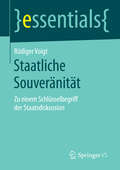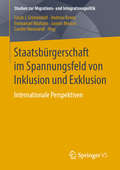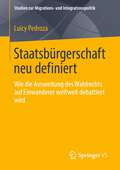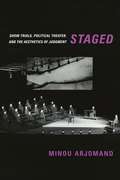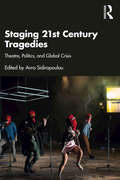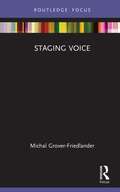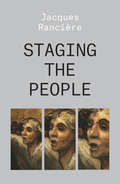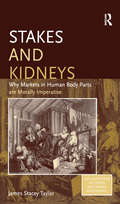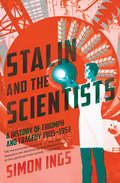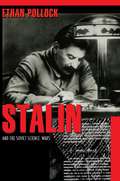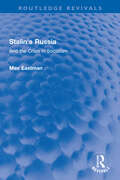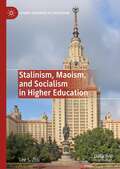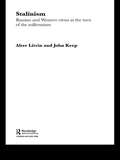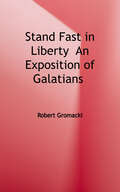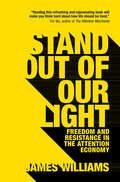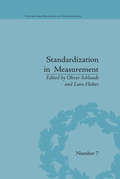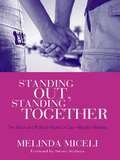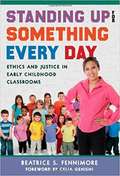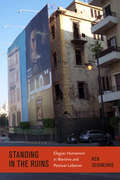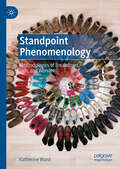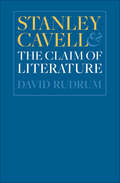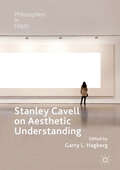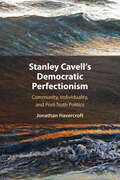- Table View
- List View
Staatliche Souveränität: Zu einem Schlüsselbegriff der Staatsdiskussion (essentials)
by Rüdiger VoigtDas essential erläutert zunächst die Begriffsgeschichte und Bedeutung der Souveränität für den Staat des 21. Jahrhunderts und beschreibt die drei Typen Parlamentssouveränität, Rechts- bzw. Verfassungssouveränität sowie (direkte) Volkssouveränität. Anschließend analysiert der Autor den Begriff der nationalstaatlichen Souveränität im Kontext der Globalisierung, Internationalisierung sowie Europäisierung und stellt die Auswirkungen des globalen Finanzkapitalismus auf die nationalstaatliche Souveränität dar. Die Übertragung von Kernkompetenzen an die Europäische Union bei gleichzeitigem Souveränitätsverlust der Mitgliedstaaten und die Kontroverse zwischen Universalisten, Nationalisten und Partikularisten werden kritisch diskutiert. Abschließend liefert das essential Ansatzpunkte zu einer Erneuerung der Volkssouveränität im demokratischen Rechtsstaat.
Staatsbürgerschaft im Spannungsfeld von Inklusion und Exklusion: Internationale Perspektiven (Studien zur Migrations- und Integrationspolitik)
by Sarah J. Grünendahl Andreas Kewes Emmanuel Ndahayo Jasmin Mouissi Carolin NieswandtStaatsbürgerschaft gilt in soziologischer Theorie und politischer Praxis als Ausdruck gesellschaftlicher Zugehörigkeit und politischer Teilhabe. Der Band lädt dazu ein, sich dem Konzept der Staatsbürgerschaft als einem wandelbaren und spannungsreichen Konzept zu nähern. Einerseits zeigen die Beiträge, wie die Ergänzung und praktische Inanspruchnahme von (Staats-)Bürgerschaft auf lokaler Ebene und in zivilgesellschaftlichen Kontexten geschieht. Andererseits gerät auch die exklusive Wirkung von Staatsbürgerschaft in gesellschaftlichen Aushandlungen, rechtlicher Praxis und (Bildungs-) Politiken in den Blick.
Staatsbürgerschaft neu definiert: Wie die Ausweitung des Wahlrechts auf Einwanderer weltweit debattiert wird (Studien zur Migrations- und Integrationspolitik)
by Luicy PedrozaErweiterungen des Stimmrechts betreffen auch die Frage, wer an der Selbstbestimmung der Gemeinschaft teilnehmen darf. Durch einen umfassenden Vergleich von über 50 Fällen von Wahlrechtserweiterungen an Nicht-Staatsangehörige auf der ganzen Welt bietet dieses Buch eine breite empirische Basis, um diese Reformen zu rekonstruieren und erklärt gleichzeitig, wie Staatsbürgerschaft verstanden wird. Durch mehrere Vergleichsmethoden widerlegt die Autorin die Idee, dass manche Länder eine bestimmte „ethnische“ und andere eine „liberale“ Staatbürgerschaftskultur haben, die alle damit verbundenen Fragen determiniert. Vielmehr reflektieren die Debatten, wie Entscheidungsträger in einem dynamischen politischen Kontext ihre Reformvorschläge sowohl mittels auf Grundlage historischer Bedingungen als auch zeitgenössischer politischer Haltungen gestalten.
Staged: Show Trials, Political Theater, and the Aesthetics of Judgment
by Minou ArjomandTheater requires artifice, justice demands truth. Are these demands as irreconcilable as the pejorative term “show trials” suggests? After the Second World War, canonical directors and playwrights sought to claim a new public role for theater by restaging the era’s great trials as shows. The Nuremberg trials, the Eichmann trial, and the Auschwitz trials were all performed multiple times, first in courts and then in theaters. Does justice require both courtrooms and stages?In Staged, Minou Arjomand draws on a rich archive of postwar German and American rehearsals and performances to reveal how theater can become a place for forms of storytelling and judgment that are inadmissible in a court of law but indispensable for public life. She unveils the affinities between dramatists like Bertolt Brecht, Erwin Piscator, and Peter Weiss and philosophers such as Hannah Arendt and Walter Benjamin, showing how they responded to the rise of fascism with a new politics of performance. Linking performance with theories of aesthetics, history, and politics, Arjomand argues that it is not subject matter that makes theater political but rather the act of judging a performance in the company of others. Staged weaves together theater history and political philosophy into a powerful and timely case for the importance of theaters as public institutions.
Staging 21st Century Tragedies: Theatre, Politics, and Global Crisis
by Avra SidiropoulouStaging 21st Century Tragedies: Theatre, Politics, and Global Crisis is an international collection of essays by leading academics, artists, writers, and curators examining ways in which the global tragedies of our century are being negotiated in current theatre practice. In exploring the tragic in the fields of history and theory of theatre, the book approaches crisis through an understanding of the existential and political aspect of the tragic condition. Using an interdisciplinary perspective, it showcases theatre texts and productions that enter the public sphere, manifesting notably participatory, immersive, and documentary modes of expression to form a theatre of modern tragedy. The coexistence of scholarly essays with manifesto-like provocations, interviews, original plays, and diaries by theatre artists provides a rich and multifocal lens that allows readers to approach twenty-first-century theatre through historical and critical study, text and performance analysis, and creative processes. Of special value is the global scope of the collection, embracing forms of crisis theatre in many geographically diverse regions of both the East and the West. Staging 21st Century Tragedies: Theatre, Politics, and Global Crisis will be of use and interest to academics and students of political theatre, applied theatre, theatre history, and theatre theory.
Staging Voice (Routledge Voice Studies)
by Michal Grover-FriedlanderStaging Voice is a unique approach to the aesthetics of voice and its staging in performance. This study reflects on what it would mean to take opera’s decisive attribute—voice—as the foundation of its staged performance. The book thinks of staging through the medium of voice. It is a nuances exploration, which brings together scholarly and directorial interpretations, and engages in detail with less frequently performed works of major and influential 20th-century artists—Erik Satie, Bertolt Brecht and Kurt Weill—as well as exposes readers to an innovative experimental work of Evelyn Ficarra and Valerie Whittington. The study is intertwined throughout with the author’s staging of the works accessible online. This book will be of great interest to students and scholars in voice studies, opera, music theatre, musicology, directing, performance studies, practice-based research, theatre, visual art, stage design, and cultural studies.
Staging the People: The Proletarian and His Double
by David Fernbach Jacques RanciereThese essays from the 1970s mark the inception of the distinctive project that Jacques Rancière has pursued across forty years, with four interwoven themes: the study of working-class identity, of its philosophical interpretation, of "heretical" knowledge and of the relationship between work and leisure. For the short-lived journal Les Révoltes Logiques, Rancière wrote on subjects ranging across a hundred years, from the California Gold Rush to trade-union collaboration with fascism, from early feminism to the "dictatorship of the proletariat," from the respectability of the Paris Exposition to the disrespectable carousing outside the Paris gates. Rancière characteristically combines telling historical detail with deep insight into the development of the popular mind. In a new preface, he explains why such "rude words" as "people," "factory," "proletarians" and "revolution" still need to be spoken.
Stakes and Kidneys: Why Markets in Human Body Parts are Morally Imperative (Live Questions in Ethics and Moral Philosophy)
by James Stacey TaylorIt is well known that the numbers of organs that become available each year for transplantation fall far short of the numbers that are actually required. In this boldly argued book James Stacey Taylor contends that, given both this shortage and the desperate poverty that some people endure, it is morally imperative that the current methods of organ procurement be supplemented by a legal, regulated market for human transplant organs purchased from live vendors. Taylor pays particular attention to outlining the implications that recognizing the moral legitimacy of these market transactions in human body parts and reproductive capacities have for public policy.
Stalin and the Scientists: A History of Triumph and Tragedy, 1905–1953
by Simon Ings&“One of the finest, most gripping surveys of the history of Russian science in the twentieth century.&” —Douglas Smith, author of Former People: The Final Days of the Russian Aristocracy Stalin and the Scientists tells the story of the many gifted scientists who worked in Russia from the years leading up to the revolution through the death of the &“Great Scientist&” himself, Joseph Stalin. It weaves together the stories of scientists, politicians, and ideologues into an intimate and sometimes horrifying portrait of a state determined to remake the world. They often wreaked great harm. Stalin was himself an amateur botanist, and by falling under the sway of dangerous charlatans like Trofim Lysenko (who denied the existence of genes), and by relying on antiquated ideas of biology, he not only destroyed the lives of hundreds of brilliant scientists, he caused the death of millions through famine. But from atomic physics to management theory, and from radiation biology to neuroscience and psychology, these Soviet experts also made breakthroughs that forever changed agriculture, education, and medicine. A masterful book that deepens our understanding of Russian history, Stalin and the Scientists is a great achievement of research and storytelling, and a gripping look at what happens when science falls prey to politics. Longlisted for the Baillie Gifford Prize for Non-Fiction in 2016 A New York Times Book Review &“Paperback Row&” selection &“Ings&’s research is impressive and his exposition of the science is lucid . . . Filled with priceless nuggets and a cast of frauds, crackpots and tyrants, this is a lively and interesting book, and utterly relevant today.&” —The New York Times Book Review &“A must read for understanding how the ideas of scientific knowledge and technology were distorted and subverted for decades across the Soviet Union.&” —The Washington Post
Stalin and the Soviet Science Wars
by Ethan PollockBetween 1945 and 1953, while the Soviet Union confronted postwar reconstruction and Cold War crises, its unchallenged leader Joseph Stalin carved out time to study scientific disputes and dictate academic solutions. He spearheaded a discussion of "scientific" Marxist-Leninist philosophy, edited reports on genetics and physiology, adjudicated controversies about modern physics, and wrote essays on linguistics and political economy. Historians have been tempted to dismiss all this as the megalomaniacal ravings of a dying dictator. But in Stalin and the Soviet Science Wars, Ethan Pollock draws on thousands of previously unexplored archival documents to demonstrate that Stalin was in fact determined to show how scientific truth and Party doctrine reinforced one another. Socialism was supposed to be scientific, and science ideologically correct, and Stalin ostensibly embodied the perfect symbiosis between power and knowledge. Focusing on six major postwar debates in the Soviet scientific community, this elegantly written book shows that Stalin's forays into scholarship can be understood only within the context of international tensions, institutional conflicts, and the growing uncertainty about the proper relationship between scientific knowledge and Party-dictated truths. The nature of Stalin's interventions makes clear that more was at stake than high politics: these science wars were about asserting that the Party was rational and modern, and about codifying the Soviet worldview in a battle for the hearts and minds of people around the globe during the early Cold War. Ultimately, however, the effort to develop a scientific basis for Soviet ideology undermined the system's legitimacy.
Stalin and the Struggle for Supremacy in Eurasia
by Alfred J. RieberThis is a major new study of the successor states that emerged in the wake of the collapse of the great Russian, Habsburg, Iranian, Ottoman and Qing Empires and of the expansionist powers who renewed their struggle over the Eurasian borderlands through to the end of the Second World War. Surveying the great power rivalry between the Soviet Union, Nazi Germany and Imperial Japan for control over the Western and Far Eastern boundaries of Eurasia, Alfred J. Rieber provides a new framework for understanding the evolution of Soviet policy from the Revolution through to the beginning of the Cold War. Paying particular attention to the Soviet Union, the book charts how these powers adopted similar methods to the old ruling elites to expand and consolidate their conquests, ranging from colonisation and deportation to forced assimilation, but applied them with a force that far surpassed the practices of their imperial predecessors.
Stalin's Russia: And the Crisis in Socialism (Routledge Revivals)
by Max EastmanFirst published in 1940, Stalin’s Russia is a close study of the development of the Stalinist regime and the flaws in socialist doctrine that made it possible. The book examines the contrasts between the "free and equal" society heralded by the Marxist-Leninist programme and the totalitarian state that emerged in its place. It makes use of a wealth of material to cast light on the inner workings of Stalin’s regime. It explores the significance of the Stalin-Hitler pact, and argues that the word "socialism" itself became a liability to any genuine movement of liberation as a result.
Stalinism, Maoism, and Socialism in Higher Education (Global Histories of Education)
by Lee S. ZhuThis book is a comparative study of the endeavors to create a socialist system of higher education in the Soviet Union under Stalin and in China under Mao. It is organized around three themes: the convergence of Maoism with Stalinism in the early 1950s, which induced the transnational transplantation of the Soviet model of higher education to China; historical convergence between Stalinism of the First Five-Year Plan period (1928–1932) and Maoism of the Great Leap period (1958–1960), which was prominently manifested in Soviet and Chinese higher education policies in these respective periods; the eventual divergence of Maoism from Stalinism on the definition of socialist society, which was evinced in the different final outcomes of the Maoist and Stalinist endeavors to create a socialist system of higher learning.
Stalinism: Russian and Western Views at the Turn of the Millenium (Totalitarianism Movements and Political Religions)
by John L. Keep Alter L. LitvinStalinism surveys the efforts made in recent years by professional historians, in Russia and the West, to better understand what really went on in the USSR between 1929 and 1953, when the country's affairs were shrouded in secrecy. The opening of the Soviet archives in 1991 has led to a profusion of historical studies, whose strengths and weaknesses are assessed here impartially though not uncritically. While Joseph Stalin now emerges as a less omnipotent figure than he seemed to be at the time, most serious writers accept that the system over which he ruled was despotic and totalitarian. Some nostalgic nationalists in Russia, along with some Western post-modernists, disagree. Their arguments are carefully dissected here. Stalinism was of course much more than state sponsored terror, and so due attention is paid to a wide range of socio-economic and cultural problems. Keep and Litvin applaud the efforts of Soviet citizens to express dissenting views.
Stand Fast in Liberty: An Exposition of Galatians (The Gromacki Expository Series)
by Robert GromackiPastors, teachers, Bible schools and colleges, and study groups will benefit from these fine expositions. Based on the English text (KJV), Dr. Gromacki uses his expertise and gifting to present the meaning of the epistle in a clear and straightforward manner. Necessary technical matters and notes on the Greek are included, but they are confined to the footnotes. These books are divided into thirteen chapters, each of which is followed by challenging discussion questions.
Stand Out of Our Light: Freedom And Resistance In The Attention Economy
by James WilliamsFormer Google advertising strategist, now Oxford-trained philosopher James Williams launches a plea to society and to the tech industry to help ensure that the technology we all carry with us every day does not distract us from pursuing our true goals in life. <P><P>As information becomes ever more plentiful, the resource that is becoming more scarce is our attention. In this 'attention economy', we need to recognise the fundamental impacts of our new information environment on our lives in order to take back control. Drawing on insights ranging from Diogenes to contemporary tech leaders, Williams's thoughtful and impassioned analysis is sure to provoke discussion and debate. Williams is the inaugural winner of the Nine Dots Prize, a new Prize for creative thinking that tackles contemporary social issues. This title is also available as Open Access.<P> Powerfully argues for the reclamation of individual agency and freedom in a world where our attention is vied over by tech companies<P> Presents a combination of technological and philosophical insight into the implications of the burgeoning 'attention economy',<P> Authored by the inaugural winner of the Nine Dots Prize, a new, biannual prize for creative thinking that tackles contemporary social issues. This title is also available as Open Access
Standardization in Measurement: Philosophical, Historical and Sociological Issues (History and Philosophy of Technoscience #7)
by Oliver Schlaudt Lara HuberThe application of standard measurement is a cornerstone of modern science. In this collection of essays, standardization of procedure, units of measurement and the epistemology of standardization are addressed by specialists from sociology, history and the philosophy of science.
Standards of English in Higher Education
by Neil MurrayThe student demographic of universities today has changed quite dramatically from even a decade ago. As universities seek to internationalise, widen participation and derive attendant reputational and financial benefits, along with greater opportunities for research collaborations and industry links, they also face a growing challenge associated with what Neil Murray terms 'the English language question'. In particular, as the proportion of students of non-English speaking backgrounds entering universities increases, there is growing concern over levels of language proficiency and what this can mean for educational standards, the student experience and, ultimately, institutional standing. Standards of English in Higher Education unpacks a number of key and interrelated issues - for example, the assessment of proficiency and the structure and nature of provision - that bear on the question of English language standards and in doing so offers a frank critical appraisal of English language in higher education today.
Standing Out, Standing Together: The Social and Political Impact of Gay-Straight Alliances
by Melinda MiceliJust a decade ago, requests by students to establish groups to support gay and lesbian students were rare and generally met with shock and confusion by school administrators and local communities. Today there are more than 1600 gay straight alliances (GSAs) across the country. Standing Out, Standing Together documents the emergence of gay straight alliances in public schools across America - from factors that have contributed to the relatively rapid spread of GSA to those that stirred controversy and posed roadblocks. Using over 10 years of interviews with students, teachers, administrators and political activists; case studies; and local and national media reports, Miceli explores the personal and political stakes involved in the battles over GSAs. Although the book acknowledges and documents the harassment, abuse and problems suffered by many gay, lesbian, transgendered, and bisexual students, its primary focus is on these students as political activists, rather than as passive victims, making it a unique contribution to sociologists, educators, political activists and LGBTreaders alike.
Standing Up for Something Every Day: Ethics and Justice In Early Childhood Classrooms (Early Childhood Education)
by Beatrice S. Fennimore Sharon RyanStanding Up for Something Every Day is written for present and future teachers in the early childhood classroom who truly want to make a difference in the lives of children. Exploring some of the most complex and pressing social and ethical dilemmas confronting early childhood educators, the author provides concrete ways of addressing social justice concerns in practice. Four model teacher-guides accompany readers from chapter to chapter, and demonstrate strategies for standing up for children through ethics, respect for diversity, and commitment to advocacy. This book offers important insights, encouragement, and practical suggestions to early childhood educators who are committed to excellence and equity in their classrooms.
Standing by the Ruins: Elegiac Humanism in Wartime and Postwar Lebanon
by Ken SeigneurieSince the mid-1970s, Lebanon has been at the center of the worldwide rise in sectarian extremism. Its cultural output has both mediated and resisted this rise. Standing by the Ruins reviews the role of culture in supporting sectarianism, yet argues for the emergence of a distinctive aesthetic of resistance to it. Focusing on contemporary Lebanese fiction, film, and popular culture, this book shows how artists reappropriated the twin legacies of commitment literature and the ancient topos of “standing by the ruins” to form a new “elegiac humanism” during the tumultuous period of 1975 to 2005. It redirects attention to the critical role of culture in conditioning attitudes throughout society and is therefore relevant to other societies facing sectarian extremism.Standing by the Ruins is also a strong intervention in the burgeoning field of World Literature. Elaborating on the great Arabist Hilary Kilpatrick’s crucial insight that ancient Arabic forms and topoi filter into modern literature, the author details how the “standing by the ruins” topos—and the structure of feeling it conditions—has migrated over time. Modern Arabic novels, feature films, and popular culture, far from being simply cultural imports, are hybrid forms deployed to respond to the challenges of contemporary Arab society. As such, they can take their place within a World Literature paradigm: they are cultural products that travel and intervene in the world.
Standpoint Phenomenology: Methodologies of Breakdown, Sign, and Wonder
by Katherine WardThis book introduces a standpoint approach to phenomenology and reconceives the phenomenological project as not an individual but a communal endeavor—one that, importantly, requires insight from across the spectrum of human experience and especially experiences of those who have traditionally been absent from the discipline. To develop this approach, the book draws on the feminist tradition of standpoint epistemology. The book borrows two of standpoint epistemology’s key theses—that of situated knowledge (what we know is shaped and often limited by our social location) and inverted privilege (epistemological advantage can in some contexts be inversely related to one’s social location). In standpoint phenomenology, these develop into the thesis of situated phenomenology and inverted phenomenological privilege respectively. This book presents three specific methodologies that support the standpoint approach to phenomenology: the methodologies of breakdown, sign, and wonder. All have their origins in the classical phenomenological work of Heidegger and Merleau-Ponty. Though these methods are used by these phenomenologists, they are not explicitly articulated or explained in any detail. The book lays out how and why these methodologies can be used to reveal the conditions supporting human existence and then highlights the role each might play in a standpoint approach to phenomenology.
Stanley Cavell and the Claim of Literature
by David RudrumAn analysis of the significance of literature in the work of one of America's most influential contemporary philosophers.Stanley Cavell is widely recognized as one of America's most important contemporary philosophers, and his legacy and writings continue to attract considerable attention among literary critics and theorists. Stanley Cavell and the Claim of Literature comprehensively addresses the importance of literature in Cavell's philosophy and, in turn, the potential effect of his philosophy on contemporary literary criticism.David Rudrum dedicates a chapter to each of the writers that principally occupy Cavell, including Shakespeare, Thoreau, Beckett, Wordsworth, Ibsen, and Poe, and incorporates chapters on tragedy, skepticism, ethics, and politics. Through detailed analysis of these works, Rudrum explores Cavell's ideas on the nature of reading; the relationships among literary language, ordinary language, and performative language; the status of authors and characters; the link between tragedy and ethics; and the nature of political conversation in a democracy.
Stanley Cavell on Aesthetic Understanding (Philosophers in Depth)
by Garry L. HagbergThis book investigates the scope and significance of Stanley Cavell’s lifelong and lasting contribution to aesthetic understanding. Focusing on various strands of the rich body of Cavell’s philosophical work, the authors explore connections between his wide-ranging writings on literature, music, film, opera, autobiography, Wittgenstein, and Austin to contemporary currents in aesthetic thinking. Most centrally, the writings brought together here from an international team of senior, mid-career, and emerging scholars, explore the illuminating power of Cavell’s work for our deeper and richer comprehension of the intricate relations between aesthetic and ethical understanding. The chapters show what aesthetic understanding consists of, how such understanding might be articulated in the tradition of Cavell following Wittgenstein and J. L. Austin, and why this mode of human understanding is particularly important. At a time of quickening interest in Cavell and the tradition of which he is a central part and present-day leading exponent, this book offers insight into the deepest contributions of a major American philosopher and the profound role that aesthetic experience can play in the humane understanding of persons, society, and culture.
Stanley Cavell's Democratic Perfectionism: Community, Individuality, and Post-Truth Politics
by Jonathan HavercroftPost-truth politics is both a result of a democratic culture in which each person is encouraged to voice their opinion, and a threat to the continuation of democracy as partisans seek to deny political standing to those with incommensurate world views. Are there resources within political theory for overcoming this tension? This book argues that Stanley Cavell's philosophy provides a conceptual framework for responding to post-truth politics. Jonathan Havercroft develops an original interpretation of Stanley Cavell as a theorist of democratic perfectionism. By placing Cavell's writings in conversation with political theorists on debates about the social contract, interpretive methods, democratic theory and political aesthetics, Stanley Cavell's Democratic Perfectionism cultivates modes of responsiveness that strengthen our democratic culture and help us resist the contemporary crisis of democratic backsliding. Each chapter diagnoses a sceptical crisis in contemporary politics and a mode of responsiveness in Cavell's thought that can respond to that crisis.
